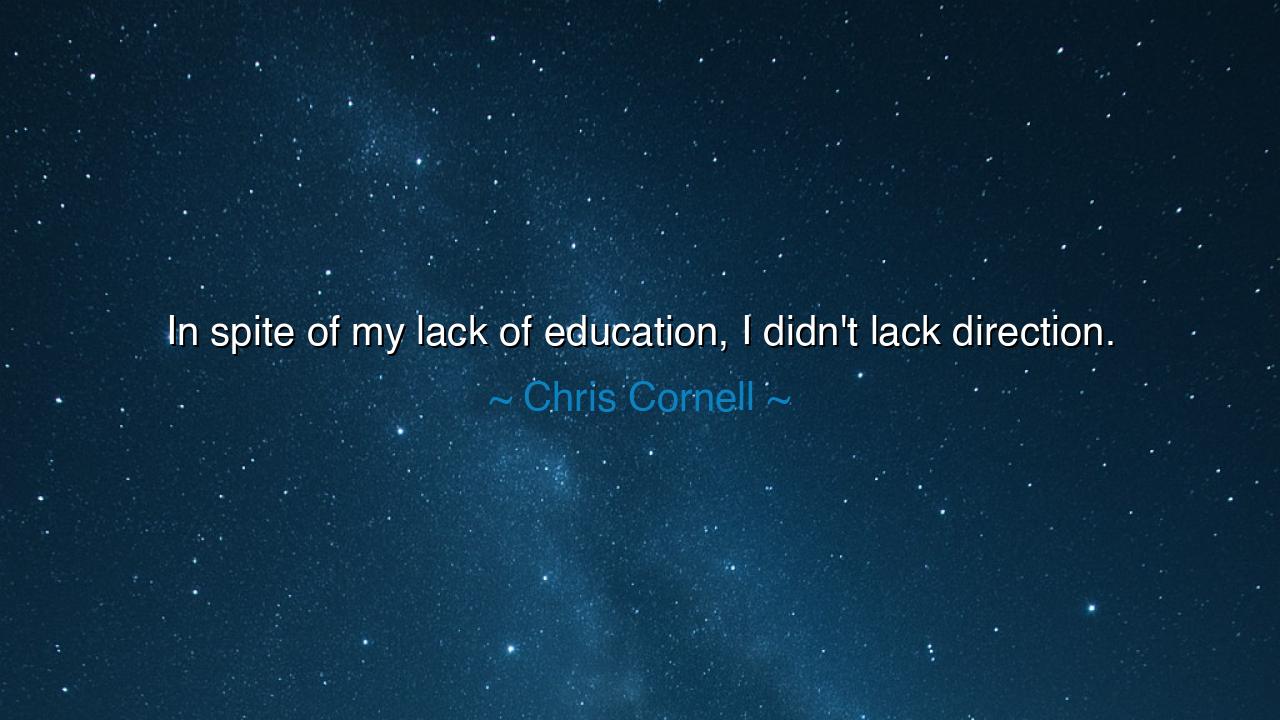
In spite of my lack of education, I didn't lack direction.






“In spite of my lack of education, I didn’t lack direction.” Thus spoke Chris Cornell, the poet and prophet of song, whose voice rose from the depths of struggle to touch the heavens of art. His words carry the weight of a soul that knew both darkness and light—a man who, though he did not walk the formal path of learning, found his way through conviction, purpose, and passion. In this humble yet defiant statement lies an ancient truth: that education and direction are not the same, and that one’s destiny is not bound by classrooms or credentials, but by the strength of one’s inner compass.
To say “I didn’t lack direction” is to affirm that knowledge of the mind is but one part of life’s wisdom, and that there exists another education—the education of the heart, of experience, of intuition. Many are rich in learning yet poor in purpose, wandering from one pursuit to another, unsure of why they live. But there are those, like Cornell, who possess the opposite gift: they may lack formal schooling, yet their direction burns bright within them, like a star guiding their steps. For what is knowledge without purpose? It is like a ship with sails but no helm—impressive to behold, yet lost upon the sea.
Chris Cornell, though he left school at an early age, became one of the most powerful voices in modern music. His lyrics spoke of pain, redemption, and the search for meaning in a fractured world. He was a self-taught craftsman of emotion, drawing from his own suffering to create beauty that touched millions. His direction was not imposed from outside—it was born within, nurtured by passion and the unquenchable desire to express truth. He proved that even without formal education, a person guided by purpose can rise above limitation, for direction is a form of wisdom greater than knowledge itself.
History is rich with such souls. Abraham Lincoln, born in poverty, received less than a year of schooling, yet became one of the greatest leaders of mankind. His lack of education did not hinder his journey; instead, he educated himself through curiosity, discipline, and moral vision. He read by candlelight, thought deeply, and followed the direction of justice that stirred within him. Like Cornell, Lincoln’s strength was not found in the lessons others gave him, but in the purpose he gave himself. Their lives both teach that true education begins not in the school, but in the heart that seeks meaning.
The ancients, too, honored this truth. The philosopher Diogenes, who lived in poverty and rejected material wealth, was often mocked for his lack of formal study. Yet even Alexander the Great sought him out, saying, “If I were not Alexander, I would wish to be Diogenes.” For the philosopher’s wisdom came not from books, but from clarity of direction—the knowledge of who he was, and what he sought in life. So it has always been: the educated without purpose are many; the uneducated with purpose are few—and they are the ones who move the world.
Yet Cornell’s words carry another layer of meaning: they remind us that direction is not inherited—it is chosen. One must decide what path to walk, even when the road is unclear. Life offers endless distractions, countless teachers, and infinite opinions—but only one true calling. Education may teach us how to think, but direction teaches us why. It gives our efforts shape, our struggles meaning, our achievements soul. It is the fire that makes all learning, all experience, come alive. Without it, even the most brilliant mind drifts aimlessly. With it, even the humblest spirit finds greatness.
Therefore, O seeker of wisdom, remember this: formal education is a gift, but direction is destiny. If you have learning, let it serve your purpose; if you lack learning, let your purpose drive your learning. Seek knowledge wherever you can, but never mistake it for meaning. Ask yourself not, “What should I study?” but, “What am I meant to do?” For as Chris Cornell taught through his life and art, it is better to be uneducated and driven than learned and lost.
The lesson is clear: life does not reward the one who knows the most, but the one who moves with conviction. Direction is the inner compass that turns confusion into creation, doubt into courage, and pain into beauty. So find your direction—listen to the voice within that tells you who you are and where you must go. For even in the absence of formal education, if your purpose burns bright, you will light your own path—and in doing so, you may illuminate the world.






AAdministratorAdministrator
Welcome, honored guests. Please leave a comment, we will respond soon